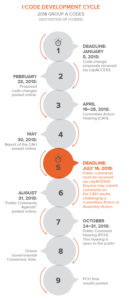 Proposals relating to wind and anchoring requirements were disapproved in the ICC’s Committee Action Hearing, but could return via public comments.
Proposals relating to wind and anchoring requirements were disapproved in the ICC’s Committee Action Hearing, but could return via public comments.
One of two code revisions proposed by IFAI’s Tent Rental Division (TRD) was approved by the Fire Code Committee of the International Code Council (ICC) in April.
Through debate and voting at its Committee Action Hearing (CAH), the ICC took its first votes to revise codes in the Group A I-Code Development Cycle for the 2021 Model Code.
Various stakeholders submitted 16 code change proposals that had the potential to affect tent rental businesses or related industries. The committee approved five of those proposals as submitted or with modifications. Those that were disapproved can be returned to the revision process through public comments.
TRD Code Committee chair Tom Markel, Bravo Events, Buffalo, N.Y., and code consultant Paul Armstrong, P.E., C.B.O., advocated on behalf of TRD at the hearing. The overall results from the meeting are positive for the industry, Markel says, demonstrating the value in having industry representatives present at ICC hearings.
“You have to be there working the room, working the code officials, getting those that you can on your side so that they will stand up for your proposals and stand up against other ones they know are wrong,” he says.
Flame propagation performance treatment
Approved with language modifications, this TRD proposal (F242-18) will modernize the code to reflect current testing practices and the fact that today’s tent fabric is inherently fire retardant and does not require retreatment.
“If you have a modern PVC tent, all you are going to have to show is that this tent meets the flame propagation of NFPA 701 test method 1 or 2,” Markel says. “That’s what the label has to say and that’s what your documentation has to say.”
An additional proposal (F242-18) submitted by the ICC’s Fire Code Action Committee that clarifies testing and certification to NFPA 701 was also approved. A third proposal relating to flame propagation (F244-18) was disapproved because of the approval of the other two proposals.
Wind and anchoring requirements
The TRD code revision proposal addressing wind and anchoring requirements (F238-18) was disapproved, as was a proposal (F239-18) on this issue submitted by Richard Nix representing Entertainment Services & Technology Association and Event Safety Alliance. TRD’s proposal would replace the structural engineering requirements in the 2018 Model Code (requiring site or engineering documentation for tents with 1,000-person occupancy and/or 7,500 square feet) with a table that sets minimum wind loads and documentation requirements based on length of installation, occupant load, square footage and number of stories.
Markel says that with regard to the TRD proposal, there was some confusion on the committee about when tent manufacturer instructions come into
play, as well as manufacturer documentation from design professionals. It’s possible that TRD will rework some of the language.
“If we want to continue pushing this proposal in this cycle, we would have to come up with a public comment,” he says. “We would have to discuss where the thresholds have to start, and maybe tents under a certain size might get eliminated [from the requirements].”
Other proposals of note
- Definition of special event structures (G147-18). Approved with modifications, this revision aligns language in the International Building Code with language in the International Fire Code.
- Sprinkler requirements for fabric roof buildings (F187-18). Approved with modifications, this revision revised technical footnotes in the code.
- CO detectors for portable generators (F193-18). A proposal that would require portable generators to have carbon monoxide (CO) detectors was disapproved but will likely come back through the public comments process, Markel says. Questions about inventory that can’t be retrofitted and the size of the generators affected were raised during the debate. Before being disapproved, the committee approved a modification that would require compliance only of generators manufactured after Jan. 1, 2021.
- Sprinkler requirements and special amusement buildings (F237-18). Approved as submitted, this proposal is a technical change with no affect on the current code.
Additional proposals from non-TRD stakeholders that were disapproved addressed crowd management, air-inflated structures, bounce houses, on-site
responsibiilty for event structures and operations plans, and mandatory weather evacuations.
The International Code Council (ICC) uses a three-year cycle to develop model codes. Tents and temporary structure fall under the International Fire Code (IFC). For this code cycle, the IFC is in Group A.
Code proposals approved at the Committee Action Hearing in April that do not receive a public comment will go into a consensus document that will be approved following the Public Comment Hearing (PCH) in October. Code proposals that receive public comments can be modified at the PCH prior to the vote. Code proposals that were disapproved at the CAH can also be brought back via public comments.
 TEXTILES.ORG
TEXTILES.ORG


